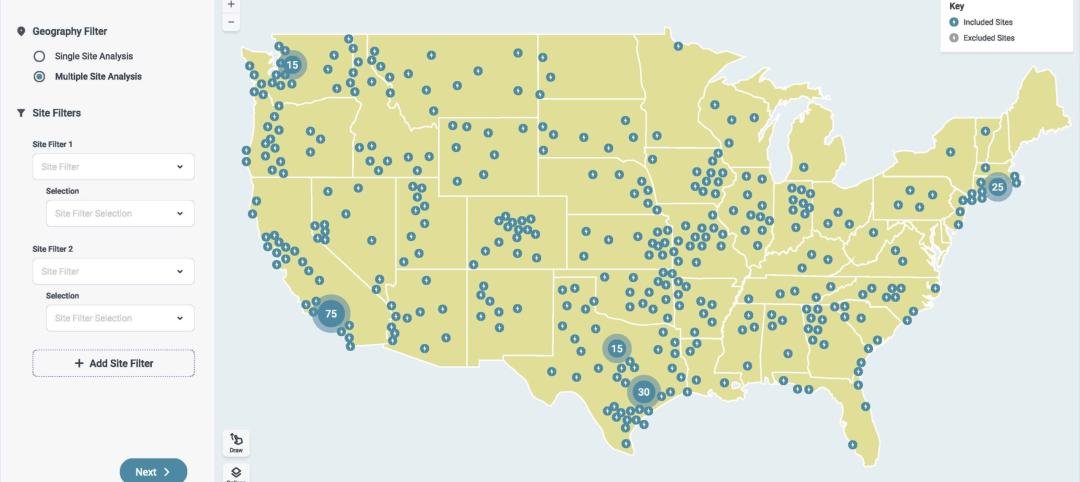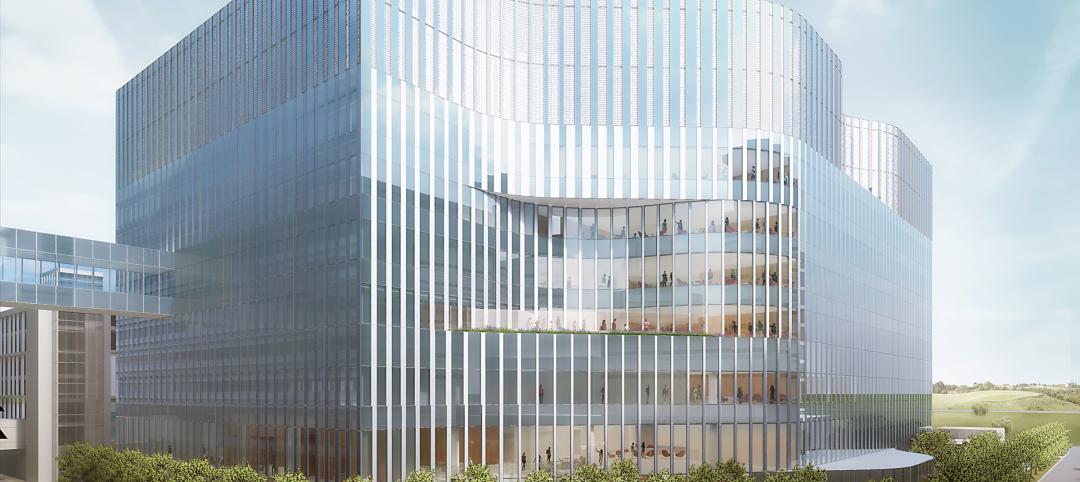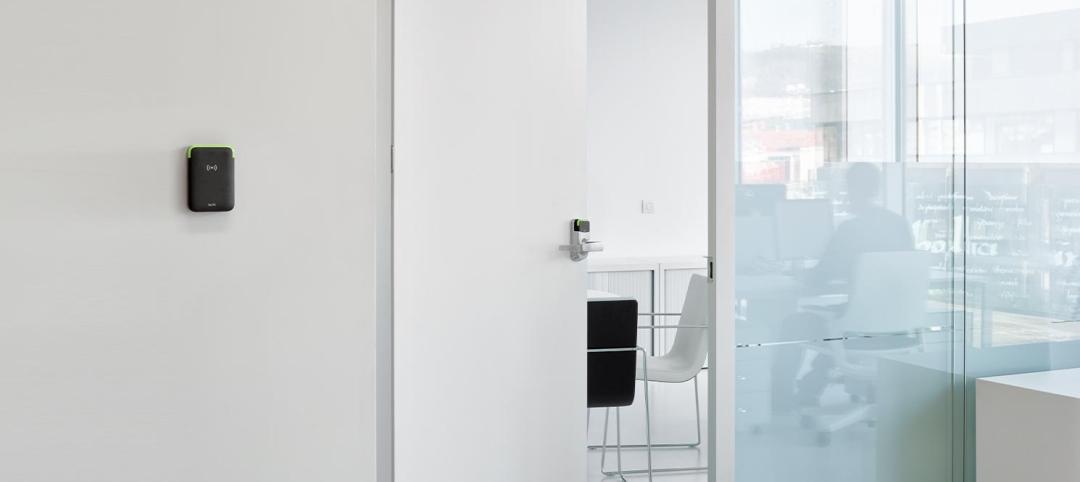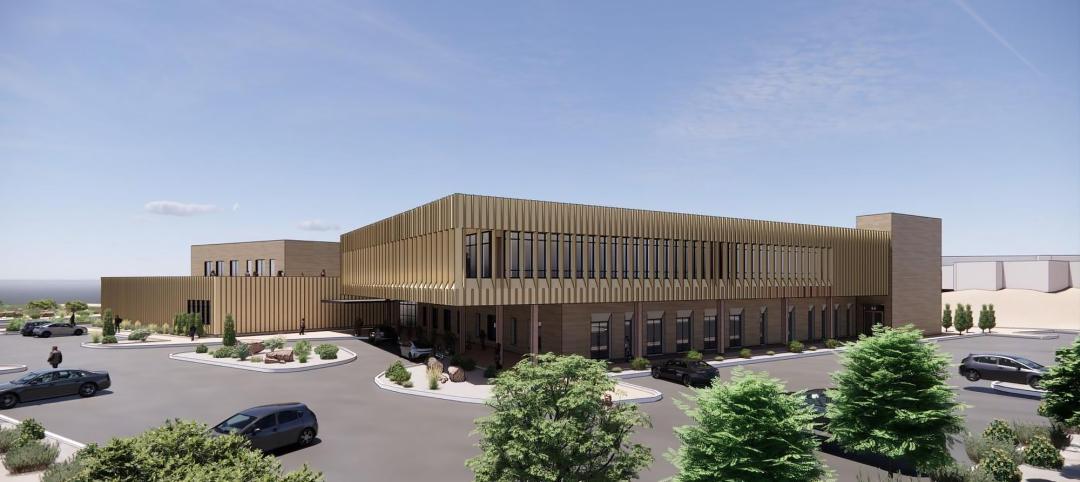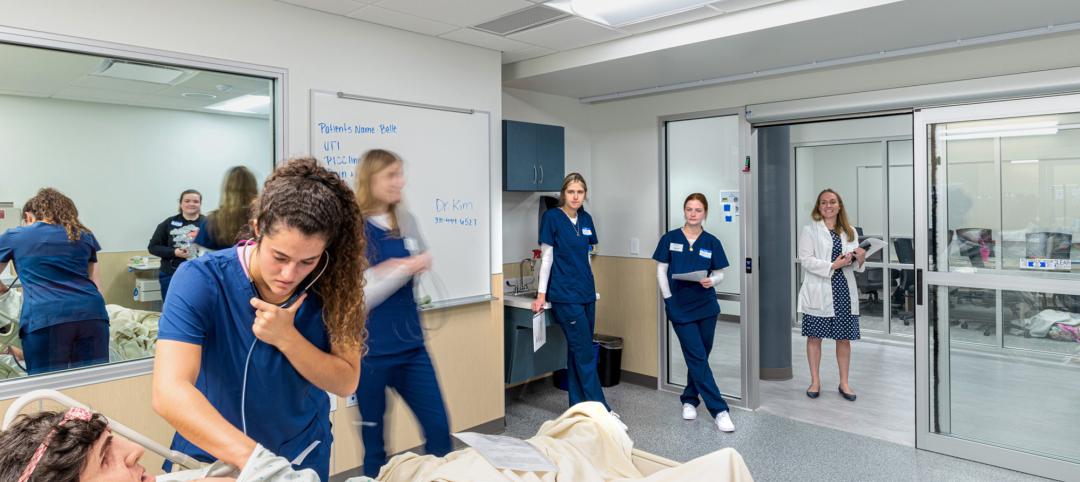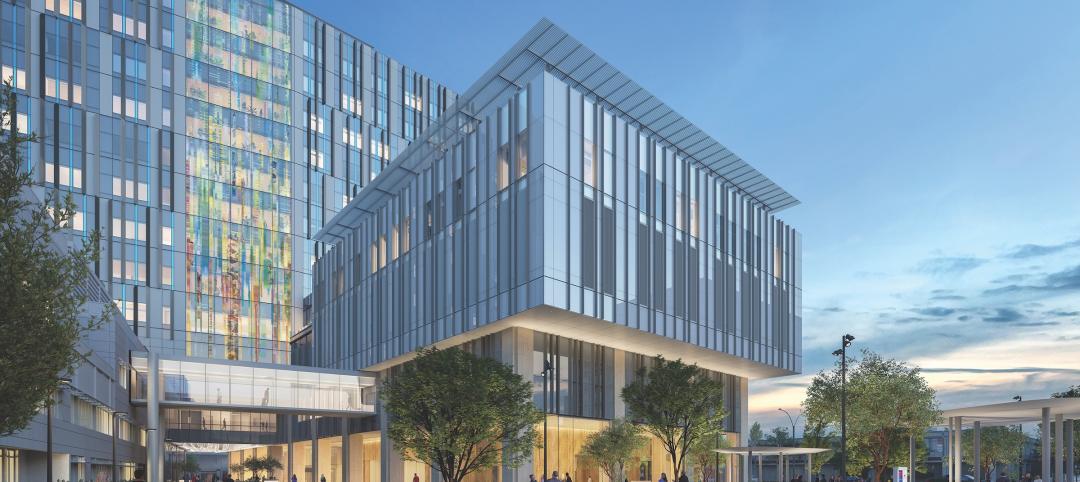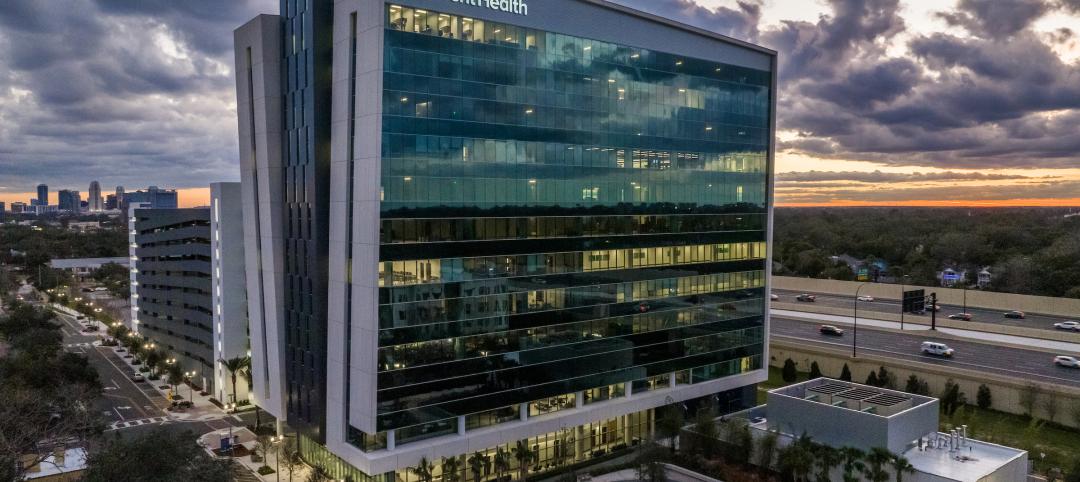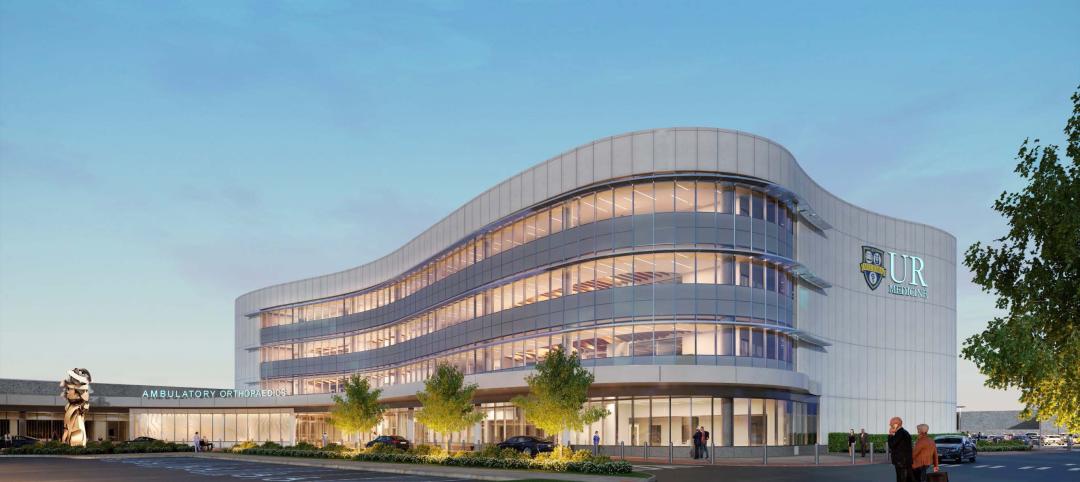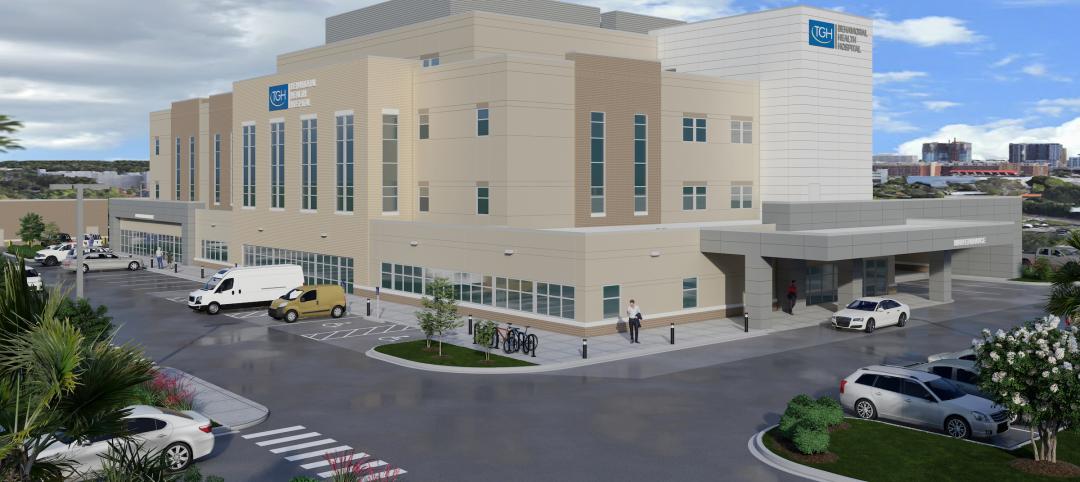In 2012, the architectural firm Page Southerland Page did pro bono programming work for Healthcare for the Homeless Houston (HHH), a nonprofit organization that provides long-term care for that city’s homeless men, women, and children.
At the time, HHH—which was founded in 1999 and is part of a national organization with more than 150 health centers—was operating out of a shoebox, a 6,425-sf building it shared with another homeless services group. The programming was conducted with an eye toward assisting HHH in its strategy to relocate and expand.
“They knew they had to leave that building,” recalls Kurt Neubek, FAIA, Principal with Page’s Houston office.
The organization found a three-story, 24,250-sf building that had been a Merchant Marine hall known as the Seafarer’s Union, which HHH selected in part for its proximity to St. Joseph Hospital, which handles many homeless patients.
“Our goal was to design the clinic around our clinical model,” which is the integration of primary care, behavioral care, and consultation and case management services, explains Frances Isbell, M.A., HHH’s chief executive officer. “We also didn’t want it to look like a bus station.”
Last February, HHH celebrated its first anniversary in its new, larger digs, whose extensive renovation presented a number of challenges to a Building Team that included Page (architect and MEP engineer), WSP (co-consultant), ASA Daily (SE), H2B Engineers (CE), Forney Construction (CE), FMG Design (signage and graphics), and TechKnowledge (A/V, IT, Security).
For one thing, each floorplate is only 8,000 sf. Half of the first floor was taken up by indoor parking. And the third floor was a giant open meeting room.
The first thing that Page did, says Neubek, was to move the front door to the short side of the building, partly to dissuade the homeless from congregating at a nearby restaurant. Page also relocated the parking garage to the back of the first floor, which freed up a bit more administrative space.
The second floor includes the main reception desk and the medical clinic with 12 exam rooms, an in-house pharmacy, and small testing labs. The design of this floor is a flexible module so offices can be converted to exam rooms if needed, and vice versa.
The third floor has six dental stations—dental care being HHH’s most sought-after service, says Isbell—and behavioral health spaces and offices with glass sidelights that allow more daylight to come onto the floor. The third floor includes workstations, training areas, and lockers for HHH’s 400 annual volunteers.

A “grand staircase” between waiting rooms ties together the floors of this facility. Vinyl plank flooring was selected for its durability and sense of warmth. Image: Slyworks Photography/Courtesy of Page.
Before construction, exam rooms were mocked up to allow physicians and attending staff to determine if counter and cabinet heights and spaces between equipment were positioned properly. Patient rooms were also oriented toward the back of the building, which provides the staff with a higher measure of safety in the event that patient behavior becomes problematic.
Other design accommodations include an open staircase between waiting areas that ties the floors together, more exterior coverage over the reclad entryway with a new exterior lantern, a new elevator, and larger energy efficiency windows. The second floor clinic offers patients electrical outlets where they can recharge the mobile devices. Translucent partitions between the dental stations and waiting rooms offer privacy while still letting light permeate the building.
One of the more noticeable features of the new building is its flooring. Isbell says that it had to be durable, “as people living on the street are bringing all of their worldly possessions in with them.” HHH also wanted the interior design to provide a sense of warmth. So 2,232 sf of the second and third floors and stairwell are covered with Parterre’s ingrained natural oak luxury vinyl planks.

Dental care is the most sought-after service at Healthcare for the Homeless Houston's new facility, which has six dental stations bookended by translucent partitions. Image: Slyworks Photography/Courtesy of Page.
The whole project cost about $8.5 million, which HHH financed through a combination of state and private foundation grants. Neubek says TechKnowledge donated all of its services, and most of the ceiling tile and lighting used for the renovation were donated, too.
Isbell says that moving into the new center is a benchmark for this organization, which operates two other facilities in Houston. Most important, it allows the organization to see more patients daily. (The three centers average about 100 per day.) But, she laughs, “if it ever happens again, I’ll retire. It was a lot of work.”
Related Stories
Engineers | Nov 27, 2023
Kimley-Horn eliminates the guesswork of electric vehicle charger site selection
Private businesses and governments can now choose their new electric vehicle (EV) charger locations with data-driven precision. Kimley-Horn, the national engineering, planning, and design consulting firm, today launched TREDLite EV, a cloud-based tool that helps organizations develop and optimize their EV charger deployment strategies based on the organization’s unique priorities.
Healthcare Facilities | Nov 3, 2023
The University of Chicago Medicine is building its city’s first freestanding cancer center with inpatient and outpatient services
The University of Chicago Medicine (UChicago Medicine) is building Chicago’s first freestanding cancer center with inpatient and outpatient services. Aiming to bridge longstanding health disparities on Chicago’s South Side, the $815 million project will consolidate care and about 200 team members currently spread across at least five buildings. The new facility, which broke ground in September, is expected to open to patients in spring 2027.
Sponsored | | Oct 17, 2023
The Evolution of Medical Facility Security
As the healthcare system grows, securing these facilities becomes ever more challenging. Increasingly, medical providers have multiple facilities within their networks, making traditional keying systems and credentialing impractical.
Healthcare Facilities | Oct 11, 2023
Leveraging land and light to enhance patient care
GBBN interior designer Kristin Greeley shares insights from the firm's latest project: a cancer center in Santa Fe, N.M.
Healthcare Facilities | Oct 9, 2023
Design solutions for mental health as a secondary diagnosis
Rachel Vedder, RA, LEED AP, Senior Architect, Design Collaborative, shares two design solutions for hospitals treating behavioral health patients.
Giants 400 | Oct 5, 2023
Top 115 Healthcare Construction Firms for 2023
Turner Construction, Brasfield & Gorrie, JE Dunn Construction, DPR Construction, and McCarthy Holdings top BD+C's ranking of the nation's largest healthcare sector contractors and construction management (CM) firms for 2023, as reported in Building Design+Construction's 2023 Giants 400 Report. Note: This ranking includes revenue related to all healthcare buildings work, including hospitals, medical office buildings, and outpatient facilities.
Giants 400 | Oct 5, 2023
Top 90 Healthcare Engineering Firms for 2023
Jacobs, WSP, IMEG, BR+A, and Affiliated Engineers head BD+C's ranking of the nation's largest healthcare sector engineering and engineering/architecture (EA) firms for 2023, as reported in Building Design+Construction's 2023 Giants 400 Report. Note: This ranking includes revenue related to all healthcare buildings work, including hospitals, medical office buildings, and outpatient facilities.
Giants 400 | Oct 5, 2023
Top 175 Healthcare Architecture Firms for 2023
HDR, HKS, CannonDesign, Stantec, and SmithGroup top BD+C's ranking of the nation's largest healthcare sector architecture and architecture/engineering (AE) firms for 2023, as reported in Building Design+Construction's 2023 Giants 400 Report. Note: This ranking includes revenue related to all healthcare buildings work, including hospitals, medical office buildings, and outpatient facilities.
Adaptive Reuse | Sep 19, 2023
Transforming shopping malls into 21st century neighborhoods
As we reimagine the antiquated shopping mall, Marc Asnis, AICP, Associate, Perkins&Will, details four first steps to consider.
Healthcare Facilities | Sep 13, 2023
Florida’s first freestanding academic medical behavioral health hospital breaks ground in Tampa Bay
Construction kicked off recently on TGH Behavioral Health Hospital, Florida’s first freestanding academic medical behavioral health hospital. The joint venture partnership between Tampa General (a 1,040-bed facility) and Lifepoint Behavioral Health will provide a full range of inpatient and outpatient care in specialized units for pediatrics, adolescents, adults, and geriatrics, and fills a glaring medical need in the area.



